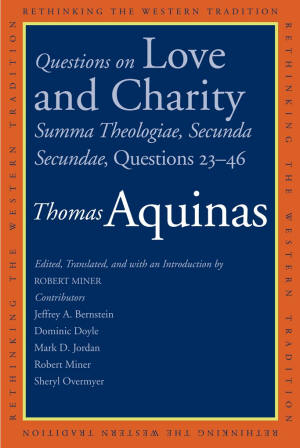Book Review
Questions on Love and Charity
Thomas Aquinas, edited by Robert Miner
Yale University Press
ISBN: 978-0300195415
 This
is a wonderfully readable, fresh new translation of Questions on love and
charity from The Summa Theologiae of Thomas Aquinas. In addition, there
are five essays by Aquinas scholars. For the purposes of this review, I
will include material from both the text and the essays in order to
examine what Aquinas has to say about these topics.
This
is a wonderfully readable, fresh new translation of Questions on love and
charity from The Summa Theologiae of Thomas Aquinas. In addition, there
are five essays by Aquinas scholars. For the purposes of this review, I
will include material from both the text and the essays in order to
examine what Aquinas has to say about these topics.
For Aquinas, charity is the greatest of the virtues, being a theological virtue infused in us by God. It is friendship with God and it puts us on the way to our highest calling: the Beatific Vision. Eternal blessedness is promised to those who possess charity. This law of divine love is also the cause of our spiritual life: if we love God, we become divinized. Charity leads us to observe the divine commands and it provides protection in adversity. In this sense, there is a certain primacy of love in the ethics of Aquinas. Indeed, the virtue of charity is especially relevant to his moral philosophy as our effort to be virtuous contributes to our happiness. However, for Aquinas, the moral virtues are incomplete so long as they do not direct us to God: they alone cannot bring us to final happiness. It is charity that rectifies our fallen wills by orientating them towards God. Friendship is also the most noble of human experiences: we love our neighbour in God. We thus love God for himself and our neighbour in God. By means of charity, all the other virtues find their perfection.
In his influential Sentences, Peter Lombard identifies charity with the Holy Spirit. Charity, he says, is not just from God, it is God. Aquinas rejects his view, claiming that The Holy Spirit dwells in us as an effect and not immediately of itself. This, for Aquinas, safeguards the divine transcendence. The Holy Spirit infuses his gift of wisdom which perfects charity: through wisdom, the Holy Spirit moves us beyond what we can do merely by the virtue of charity. Thus charity grants us the supernatural benefit of the gift of wisdom, which enables us to judge human actions according to divine principles.
Those with charity experience joy and supernatural concord: our wills are in harmony with God's will. However, as it is argued in one of the essays, Aquinas recognizes the possibility of people disagreeing in charity as concord includes within itself the capacity for rational and peaceable disagreement. Charity also includes our merciful response to the evils that beset others.
This book enables us to examine a cluster of questions on the virtue of charity and the corresponding gifts and the opposing vices. In one of the essays, it is noted that the section on charity in the Summa is four times as long as the one on hope as, for Aquinas, charity is the queen of all the virtues. The questions on charity are arranged to emphasize that it is a divine infusion acting intimately within the subject.
Aquinas describes the many benefits of possessing charity. Those who live in charity take part in the divine blessedness. The gift of charity produces pleasure in the soul and also in the body. By exercising charity, we overcome the vices of hatred, envy and despair.
This is an excellent work to deepen our appreciation of the mind of Saint Thomas.
Reviewed by Dr Pravin Thevathasan
